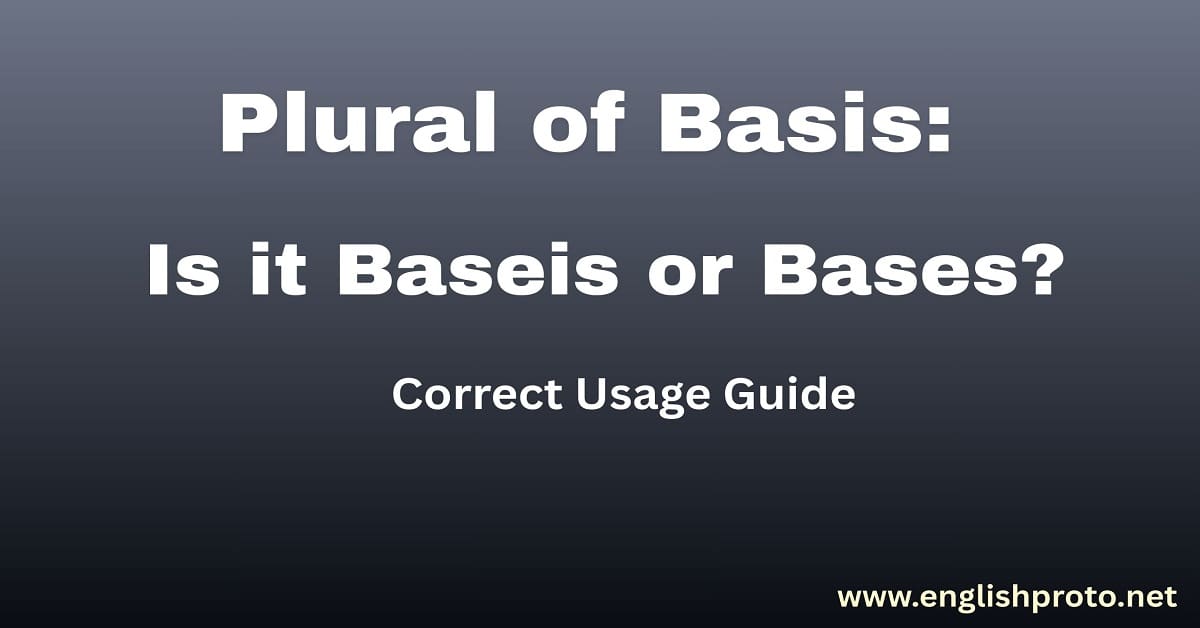What’s the Plural of Basis? Is it Baseis or Bases? If you’ve ever paused mid-sentence wondering whether to write bases or the oddly tempting baseis, you’re not alone. This tricky word often makes even confident writers second-guess themselves.
The good news? You don’t need to guess anymore. In this guide, you’ll discover the correct plural, learn why people often get it wrong, and see clear examples that make everything click. By the end, you’ll know exactly when and how to use it without hesitation.
Quick Summary
The correct plural of basis is bases (pronounced BAY-seez).
- Basis = foundation, principle, or starting point.
- Bases = multiple foundations, principles, or starting points.
- Baseis is incorrect and should not be used.
⚡ Quick Tip: Think of “analysis → analyses” or “crisis → crises.” In the same way, “basis” changes to bases, not “baseis.”
Key Takeaways
- ✅ Correct plural: bases
- ❌ Incorrect forms: baseis, basises
- Pronunciation shift: basis (BAY-sis) → bases (BAY-seez)
- Used in academic, professional, and everyday contexts
Reasons for Confusion
So why do so many people hesitate over this word? Let’s break down the main sources of confusion:
1. Greek Origin
Basis comes directly from Greek, and English borrowed it without completely “regularizing” its plural. That makes people expect a more foreign-looking ending.
2. Spelling Patterns
English learners often assume plurals should simply add -es (basis → basises). But the “-is” ending behaves differently.
3. Similar Words
Other Greek-derived words like crisis → crises or thesis → theses create irregular patterns. That makes it tempting to guess forms like baseis.
4. Pronunciation Traps
The shift from “sis” to “seez” confuses learners. It doesn’t sound like a regular plural, so some think another form must exist.
5. Limited Everyday Use
Unlike “crisis” or “analysis,” basis isn’t used in casual conversation as much. People see it more in academic or technical contexts, which makes uncertainty more likely.
Detailed Explanation
Singular Meaning: Basis
The word basis refers to the underlying support, principle, or starting point of something. It is commonly used in contexts like:
- Academic writing: The basis of the theory is well established.
- Professional contexts: The decision was made on the basis of evidence.
- Everyday language: Trust is the basis of strong relationships.
Plural Meaning: Bases
The plural bases refers to multiple foundations or principles.
Examples:
- Scientific: The bases of chemical bonding include ionic and covalent structures.
- Business: The proposal was rejected on several bases.
- Social: Different cultures have different bases for traditions.
Table: Singular vs. Plural Usage
| Singular | Plural | Example Sentence |
|---|---|---|
| Basis | Bases | The basis of her argument was clear. |
| The two bases of his conclusion were flawed. |
Notice how the pronunciation changes from BAY-sis to BAY-seez when moving to the plural.
Common Errors
Let’s explore the mistakes writers often make:
- Baseis
- Looks like it could be Greek, but it isn’t a valid form in English.
- Example (wrong): The report identified several baseis.
- Basises
- A simple over-application of the “just add -es” rule.
- Example (wrong): The study discussed different basises for comparison.
- Using Basis for Plural
- Some writers don’t change it at all.
- Example (wrong): The scientist explained the basis of the results in detail. (if referring to more than one).
⚡ Quick Tip: If you’re ever unsure, try replacing basis with foundation. If “foundations” works in your sentence, then “bases” is correct.
Synonyms or Alternatives
Depending on the context, you can avoid repetition by choosing synonyms.
For Basis (singular):
- Foundation
- Groundwork
- Starting point
- Principle
For Bases (plural):
- Foundations
- Principles
- Fundamentals
- Cornerstones
Example:
- Instead of The report outlined several bases for its conclusion, you could write The report outlined several principles for its conclusion.
Examples in Sentences
Here are practical examples showing correct usage:
- The basis of her argument was evidence-based.
- The Constitution forms the basis of American law.
- Trust and honesty are the bases of any lasting friendship.
- Multiple scientific bases support the theory of evolution.
- The teacher explained the bases of algebra before moving to advanced topics.
Origins and History
The word basis comes from the Greek word “basis” (βάσις) meaning step or foundation. It entered English through Latin in the 16th century.
Greek nouns ending in -is typically form plurals ending in -es. That’s why English inherited basis → bases, just as:
- crisis → crises
- thesis → theses
- analysis → analyses
Although English sometimes simplifies foreign patterns, in this case, the original plural form carried over. That’s why “baseis” never developed as a standard spelling.
Conclusion
So, what’s the plural of basis? The answer is straightforward: it’s bases, not baseis and not basises. The confusion comes from its Greek roots, irregular spelling, and tricky pronunciation, but the rule is simple once you know it.
Using the correct form matters because it keeps your writing polished, precise, and professional. Whether you’re drafting an essay, explaining a theory, or writing for business, getting small details like this right shows you care about clarity.
⚡ Final Takeaway: Remember one basis, many bases. If you’re ever in doubt, replace it with foundation/foundations as a quick check.



